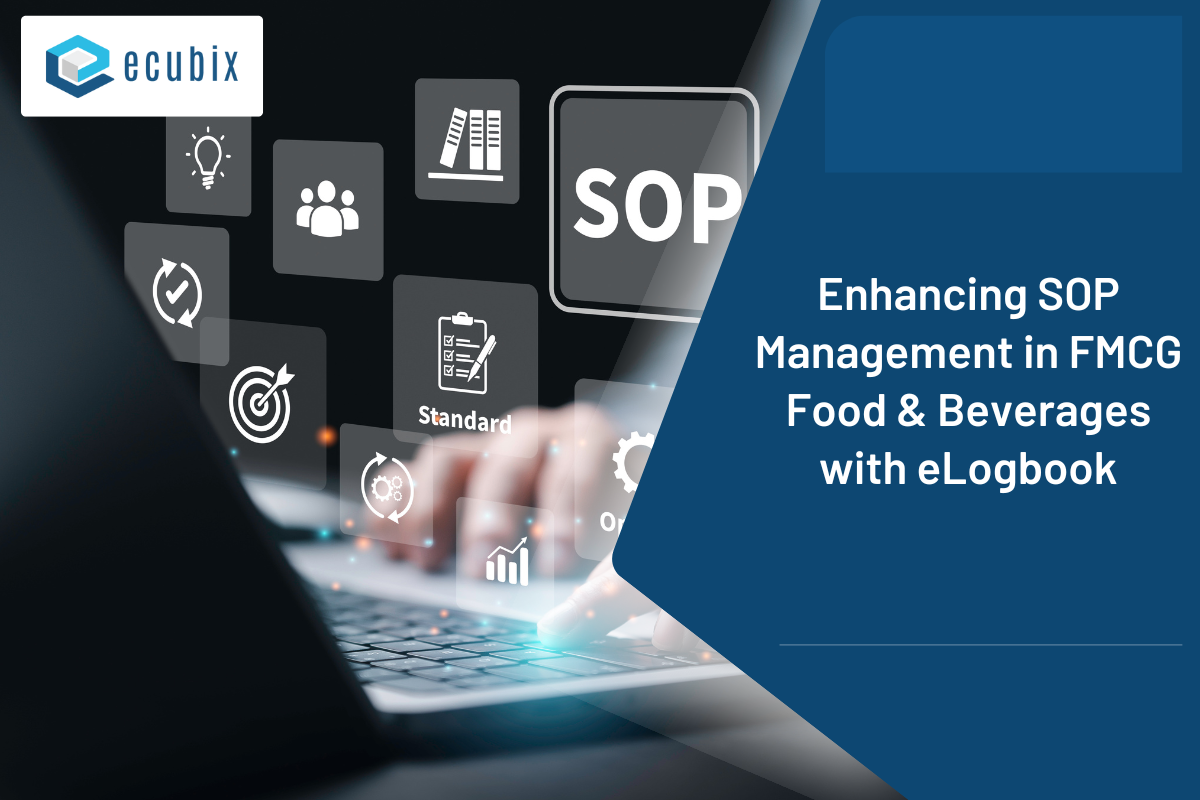
Table of Contents
Published on: September 25, 2024
In the fast-moving consumer goods (FMCG) sector, particularly within the food and beverages industry, the implementation and management of Standard Operating Procedures (SOPs) is crucial for ensuring operational consistency, product quality, and regulatory compliance. A recent study by Statista highlights that approximately 90% of food safety issues arise from deviations from established procedures or poor SOP adherence, underscoring the vital role these processes play in safeguarding product integrity and consumer safety.
Any breakdown in procedure can lead to costly recalls, reputational damage, and even legal repercussions. According to the World Health Organization (WHO), around 600 million cases of foodborne illnesses are reported globally each year, many of which could have been prevented with better operational controls.
“In an industry as sensitive and fast-paced as FMCG, particularly in food and beverages, we cannot afford inconsistencies. Our SOPs are the key to maintaining quality, safety, and compliance across all operations.” – a leading FMCG firm.
This is where eLogbook comes into play. eLogbook is a modern solution designed to automate and streamline SOP management, making it easier for companies to create, maintain, and update procedures in real-time. By integrating eLogbook, FMCG companies can ensure that their teams always work with the latest SOPs, reduce human error, and create a transparent audit trail for regulatory purposes.
Understanding SOPs in FMCG Food & Beverages
Definition and Importance:
Standard Operating Procedures (SOPs) are step-by-step instructions that guide tasks to ensure consistency, safety, and compliance within operations. In the FMCG food & beverages industry, SOPs are critical for maintaining product quality and adhering to food safety regulations. According to the Global Food Safety Initiative (GFSI), 70% of product recalls in the sector are linked to failures in adhering to proper SOPs, highlighting their importance.
Challenges in Traditional SOP Management:
(1) Paper-Based/Manual SOP Systems:
Traditional SOP systems in the FMCG food & beverages sector, such as paper-based or manual methods, are inefficient and error-prone. A study by Deloitte shows that 55% of companies still rely on manual documentation, leading to operational bottlenecks.
(2) Tracking, Version Control, and Accessibility Issues:
Manual systems make it difficult to track changes, ensure version control, and provide employees with real-time access to updated SOPs. According to Gartner, 40% of companies report errors stemming from outdated or inaccessible procedures.
(3) Delays in SOP Implementation and Audits:
SOP updates and compliance audits are often delayed due to the slow nature of manual processes. This can lead to significant downtime and missed deadlines, impacting productivity and compliance. eLogbook significantly enhances compliance and audits for manufacturers by streamlining documentation and ensuring accuracy.
(4) Regulatory and Compliance Risks:
Failure to maintain accurate and up-to-date SOPs increases the risk of non-compliance with food safety regulations. The Food and Drug Administration (FDA) reports that 65% of non-compliance issues stem from inadequate SOP management.
“Relying on outdated methods for SOP management puts companies at risk of falling behind in regulatory compliance and operational efficiency. Without streamlined SOP systems, companies face greater risks of operational errors and regulatory penalties.”
What is an eLogbook?
An eLogbook is a digital solution that automates the management of Standard Operating Procedures (SOPs) by streamlining documentation, approvals, and audits. In the FMCG food & beverages industry, eLogbook ensures that SOPs are always accessible, up-to-date, and easily trackable.
By automating these processes, eLogbook eliminates manual errors, improves version control, and ensures faster approval workflows. They also provide real-time audit trails, making regulatory compliance easier and more transparent. This significantly reduces the time spent on preparing for audits and minimizes the risk of non-compliance, boosting overall operational efficiency.
Benefits of eLogbook for SOP Management in FMCG Food & Beverages

(1) Efficiency and Time-Saving:
eLogbook accelerates SOP creation, approval, and distribution. According to McKinsey, companies using digital tools report a 30% reduction in SOP approval time.
(2) Real-Time Data Access:
With centralized access, all teams can instantly view the latest SOPs, improving communication and reducing downtime.
(3) Regulatory Compliance:
eLogbook provides automated audit trails, simplifying compliance. A study by PwC found that companies with automated compliance systems saw a 50% reduction in audit preparation time.
(4) Reduction in Human Errors:
Automation minimizes manual data entry mistakes, significantly reducing errors. Food Quality & Safety Magazine notes a 40% reduction in errors when manual processes are replaced by digital systems.
(5) Improved Accountability:
eLogbook allows easy tracking of SOP adherence and revisions, ensuring higher accountability across teams.
“The eLogbook transformed how we handle SOPs, enhancing efficiency and compliance while reducing risks of errors.”
How eLogbook Transforms SOP Workflows?

(1) Digital Templates and Standardized Workflows:
eLogbook provides digital templates and standardized workflows, allowing companies to create, modify, and distribute SOPs more efficiently. By using these templates, companies can reduce SOP creation time by 30%, according to a study by McKinsey. This standardization ensures uniformity in procedures, reducing confusion and errors across departments.
(2) Role-Based Access and Permissions:
eLogbook also enhances security and accountability by assigning role-based access to SOPs. This ensures that employees can only view or edit SOPs that are relevant to their role, reducing the risk of unauthorized changes. According to Gartner, 65% of companies improved SOP accuracy and reduced compliance risks by implementing role-based access in their digital systems.
(3) Automated Alerts and Notifications:
One of the key features of eLogbook is the automated alerts and notifications for SOP updates or changes. This ensures that all relevant personnel are immediately informed of any modifications, reducing the delay in implementation. Studies show that companies with automated SOP notifications saw a 40% increase in adherence rates (Deloitte).
Case Study: Implementation of eLogbook in Food & Beverages Company
Company Overview:
Bharat Foods Ltd., a leading food and beverage manufacturer in India, specializes in packaged snacks and beverages. With multiple production facilities across the country, Bharat Foods faced growing challenges in maintaining consistency and compliance with its Standard Operating Procedures (SOPs).
Challenges:
Before adopting an eLogbook solution, Bharat Foods relied on traditional, paper-based SOP management. This led to a series of operational bottlenecks:
- Manual Errors: Paper-based systems resulted in frequent documentation mistakes, creating confusion in procedures.
- Outdated SOPs: Ensuring that all employees were following the latest version of SOPs was a constant challenge.
- Regulatory Scrutiny: The company faced difficulties maintaining an up-to-date audit trail, leading to several compliance issues during audits.
- Time-Consuming Audits: Preparing for regulatory audits was slow and labour-intensive, often requiring weeks of preparation.
In 2022, the company was fined due to a non-compliance issue stemming from outdated SOPs, which triggered the need for a more efficient, digital solution.
Solution:
Bharat Foods implemented an eLogbook system to streamline SOP management across all its facilities. This digital platform allowed the company to automate documentation processes, manage SOP updates in real-time, and ensure compliance with Indian food safety regulations.
Results:
- Reduction in Non-Compliance Incidents: Within six months, Bharat Foods saw a 50% reduction in non-compliance incidents, thanks to better version control and automated alerts for SOP updates.
- Faster Audit Preparation: The time spent preparing for audits was reduced by 60%, from weeks to a few days, due to the real-time data access and automated audit trails provided by the powerful eLogbook system to empower frontline success in manufacturing operations.
- Improved Operational Efficiency: Automated SOP workflows led to a 30% increase in operational efficiency, as employees were always working with the latest procedures.
- Enhanced Employee Accountability: Role-based access and tracking of SOP adherence helped management ensure that all staff were aligned with the correct processes.
“The switch to eLogbook transformed our operations, allowing us to focus on product quality and innovation while maintaining regulatory compliance effortlessly.”
Summary of Key Points:
In today’s fast-paced FMCG food & beverages sector, effective SOP management is crucial for maintaining consistency, quality, and compliance. Traditional paper-based and manual SOP systems often lead to inefficiencies, tracking issues, and increased regulatory risks. eLogbook offers a transformative solution by providing standardized templates, role-based access, and automated notifications. These features streamline SOP creation, improve real-time data access, and enhance audit readiness. Real-world applications, such as the case study of Bharat Foods Ltd., illustrate the significant benefits of adopting eLogbook systems, including reduced non-compliance incidents, faster audit preparation, and improved operational efficiency.
FAQs About SOP Management in FMCG Food & Beverages with eLogbook
(1) Can an eLogbook integrate with existing ERP or quality management systems?
Yes, eLogbook is designed to integrate seamlessly with existing Enterprise Resource Planning (ERP) and quality management systems. This integration allows for smooth data flow between systems, ensuring that SOP management is synchronized with other operational processes. It also helps in maintaining consistency across various platforms and enhances overall efficiency.
(2) How does an eLogbook handle SOP version control?
An eLogbook manages SOP version control by automatically tracking and recording all changes made to SOP documents. Each version is archived, allowing users to view historical changes and revert to previous versions if necessary. The system ensures that only the most recent SOPs are active, and alerts users when updates are made, reducing the risk of working with outdated procedures.
(3) Can an eLogbook be customized to meet specific industry requirements?
Yes, eLogbook can be customized to fit specific industry requirements. The system can be tailored to address unique regulatory standards, operational workflows, and documentation needs of different industries. Customization options may include specialized templates, compliance checklists, and integration with industry-specific tools, ensuring that the eLogbook meets all relevant standards and practices.
(4) How does an eLogbook contribute to operational efficiency?
An eLogbook enhances operational efficiency by streamlining SOP management processes. It automates tasks such as document approvals, updates, and distribution, which reduces manual effort and minimizes errors. Real-time data access and automated notifications ensure that all team members are working with the most current procedures, leading to faster implementation and fewer disruptions. This efficiency helps to optimize workflow, improve productivity, and reduce operational costs.

















